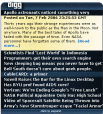Opera adds “Widgets” to device browser
Sep 5, 2006 — by LinuxDevices Staff — from the LinuxDevices Archive — views Opera Software has updated its brower for Linux-based set-top boxes, portable media players, game consoles, and other devices. Opera 9 for Devices mainly adds support for “Widgets” — small applications based on web standards, and rendered in standalone browser windows without toolbars or… other chrome.
Opera Software has updated its brower for Linux-based set-top boxes, portable media players, game consoles, and other devices. Opera 9 for Devices mainly adds support for “Widgets” — small applications based on web standards, and rendered in standalone browser windows without toolbars or… other chrome.
Opera hopes Widgets will enable OEMs and operators to deliver applications that support new Internet services and revenue streams, it says. Opera introduced Widgets in June, with the release of Opera 9 for the desktop.





Opera Widget examples
Additional touted features in Opera 9 for Devices include:
- Support for AJAX, web applications, and dynamic user interfaces
- Extensible Rendering Architecture adapts Internet pages to suit screen size
- Customizable using well-documented APIs
- Offers “full Web” experience
- Improved performance and website compatibility compared to earlier versions
- Industry-leading standards compliance
- Newly added support for Webforms 2.0, Xpath, Canvas, and SVG 1.1 Basic
- Partial support for CSS 3, including opacity, media queries, and selectors
- Native JavaScript extensions enable JavaScript to be used for device control, such as changing channels or volume in set-top boxes
- Netscape Plug-in API support simplifies porting browser plug-ins such as Adobe Flash Player 7
- Highly internationalizable, thanks to support for unicode, proprietary character encodings, and bi-directional scripts
EVP Scott Hedrick stated, “We see Widgets as new revenue source for OEMs and operators, allowing them to offer new Web-based services that add value for their customers.”
Availability
Opera 9 for Devices is available now as an SDK (software development kit) that includes precompiled binaries for several platforms. Requirements include:
- Processor: x86, PPC 405, ARM, or MIPS
- 2.4-series Linux kernel or newer
- gcc 3.2.x and glibc 2.2.x (architecture dependent)
- 4 MB of Flash and 16 MB RAM
This article was originally published on LinuxDevices.com and has been donated to the open source community by QuinStreet Inc. Please visit LinuxToday.com for up-to-date news and articles about Linux and open source.